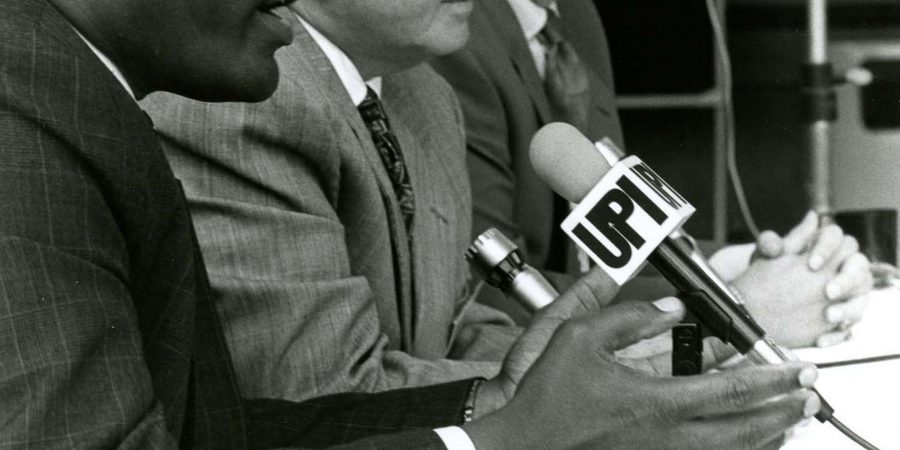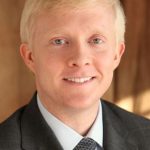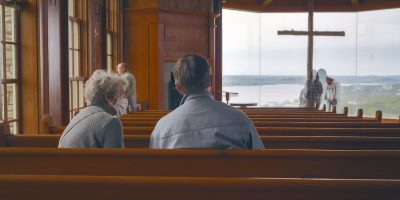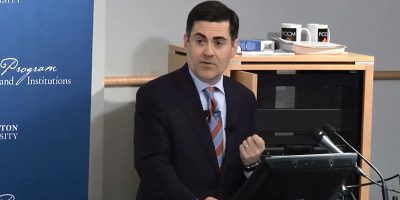Still, on the resolution's 25th anniversary, Southern Baptists have more progress to make when it comes to race.
Racial reconciliation not a ‘finished project’ 25 years after historic resolution

by David Roach
NASHVILLE, June 19, 2020 (BP) — Charles Carter chaired the Resolutions Committee that led the Southern Baptist Convention to repent of racism and make a historic push for racial reconciliation at the 1995 SBC annual meeting in Atlanta. But what may have been his most significant act of racial reconciliation that summer occurred after he returned home to Birmingham, Ala.
“As chairman of the Resolutions Committee,” Carter said, “I was going to do something specific and concrete to implement what we had tried to say in words.” So he arranged to have lunch with an African American pastor whom he had known casually. At lunch, Carter expressed his desire to be a friend and “meet occasionally.”
He will never forget the pastor’s response: “I’ve met about all I want to. I’m ready to do something.”
That launched a years-long partnership between Shades Mountain Baptist Church, where Carter was pastor, and the black church his new friend served. They exchanged pulpits, partnered to bring biblical justice to the inner city and saw church members become friends across racial lines.
A quarter century later, many Southern Baptists tell stories like Carter’s. The SBC’s words caused people to notice its racial reconciliation resolution. Subsequent actions made the statement’s impact reverberate.
Still, on the resolution’s 25th anniversary, Southern Baptists have more progress to make when it comes to race. Some key architects of the resolution believe America’s present racial strife presents the opportunity for another stride forward.
‘One of the greatest days of my life’
By 1995, the convention had a history of making statements when current events brought racism to the fore. In 1954, the SBC affirmed the U.S. Supreme Court’s school desegregation ruling in Brown v. Board of Education. In 1968, messengers denounced racism following the assassination of Martin Luther King Jr. and riots in more than 60 American cities. (Four years earlier, the convention missed an opportunity when it narrowly defeated a motion to affirm the Civil Rights Act of 1964.)
Events in the 1990s again caused Southern Baptists to think collectively about racism. Riots in Los Angeles left 63 people dead and more than 2,000 others injured after four police officers were acquitted in the beating of Rodney King, an African American. The 1995 O.J. Simpson murder trial aired public allegations of racism against the Los Angeles Police Department once more.
Those two events “helped set the need” for a 1995 SBC resolution, said Gary Frost, a black pastor who served as SBC second vice president that year. But the convention’s 150th anniversary “was the trigger” for a resolution acknowledging the SBC’s racist past.
Then-SBC President Jim Henry told a conference audience in late 1994 he had confronted prejudice in his own life and believed Southern Baptists needed to repent of racism. Henry, Frost, Christian Life Commission Executive Director Richard Land and others discussed the need for a resolution on the topic, and their efforts eventuated in a May 1995 multiethnic meeting in Nashville to draft a resolution.
“The most powerful memory of that process” was the “absolute unity in the room about what we wanted to say together,” said R. Albert Mohler Jr., then and now president of The Southern Baptist Theological Seminary, whom Frost credits as the resolution’s primary author. “It was all saturated in prayer and commitment to Christ.”
The draft was submitted to the SBC Resolutions Committee, which presented it to the convention the next month largely unchanged. The SBC adopted it by a nearly unanimous vote June 20.
“That was one of the greatest days of my life,” said Frost, who is now associational missionary for the Steel Valley Baptist Association in Warren, Ohio.
The resolution acknowledged that the convention’s relationship with African Americans “has been hindered” by slavery’s role in the SBC’s founding and stated “many” churches had “excluded African-Americans.” Messengers “lament[ed] and repudiate[d]” historic acts of racism and “apologize[d] to all African-Americans for condoning and/or perpetuating individual and systemic racism in our lifetime.”
‘Real advancement’
With the resolution adopted, the question became whether Southern Baptists would live up to it.
Leroy Gainey, the first trustee-elected black faculty member at any SBC seminary, says the convention has made definite progress in racial reconciliation since 1995. He noted his own experience as pastor of the 1,200-member First Baptist Church of Vacaville, Calif., and his service as a professor at Gateway Seminary. He added that he was among four finalists considered for the seminary’s presidency in 2004.
“I’ve seen a real advancement, some real reaching out, some real desires at brotherhood and sisterhood,” said Gainey, J.M. Frost Senior Professor of Educational Leadership at Gateway.
Among advancements, nearly 1 in 5 Southern Baptist churches is predominantly non-Anglo. Fred Luter became the SBC’s first black president in 2012, and more than two dozen Baptist state conventions that cooperate with the SBC have elected non-Anglos as their presidents. During current SBC President J.D. Greear’s first year in office, 48 percent of his committee appointments were people of color.
This week, the SBC Executive Committee elected Rolland Slade as its first African American chairman.
Yet work remains for the SBC to live up to its 1995 resolution. Despite the high percentage of non-Anglo Southern Baptist churches, 85 percent of all Southern Baptist church members are white, according to the Pew Research Center. (Just 60 percent of the U.S. population is Anglo.)
SBC entities are still seeking to increase the number of non-Anglos on their ministry staffs. The International Mission Board set a goal this year to have 75 black missionaries by 2025. At the end of last year, the number stood at 13 out of 3,700 career missionaries, according to the IMB’s 2020 CP Ministry Report. Gainey said SBC seminaries likewise have had difficulty recruiting African American professors.
Racial reconciliation is never “a completely finished project,” Mohler said. “Sanctification individually and as God’s people together comes progressively, and we need to lean into what honors God.”
Frost said two problems Southern Baptists should mobilize to address are a lack of equality in the criminal justice system and the breakdown of black families. Additionally, he said, Christians can show America that creation in God’s image is the only objective basis for racial equality.
“Conservative African American Christians need our white brothers to step up,” he said.
‘A strong hope’
In the wake of protests over the killing of George Floyd, an unarmed black man, by Minneapolis police, there are indications some believers may indeed be stepping up. A Barna survey released June 16 found nearly all U.S. pastors agree that “the church has a responsibility to denounce racism,” and most (62 percent) say their church has made a statement on the unrest stemming from Floyd’s death.
SBC leaders issued a statement May 30 acknowledging that “in the hearts of our fellow citizens of color,” incidents like Floyd’s death “connect to a long history of unequal justice in our country.” Three SBC seminary professors wrote a June 15 op-ed in North Carolina’s Biblical Recorder newsjournal noting “examples of racism” across America “just in the last few weeks.” They urged believers to “listen willingly” to the perspectives of all people and “strive sincerely to find common ground.”
This summer, the SBC was scheduled to elect more non-Anglos to boards and committees and hear Greear’s vision for racial reconciliation during the contentious 2020 U.S. presidential election. Because of the COVID-19 pandemic, which prompted cancellation of the 2020 SBC Annual Meeting, those plans were put on hold. Nonetheless, observers inside and outside the SBC have noted new opportunities to build on the 1995 resolution.
Among them is Charlie Dates, a black Chicago pastor whose church recently began to cooperate with the SBC. He expressed his view during a June 17 online conversation about “race in America” hosted by Executive Committee President and CEO Ronnie Floyd.
“If some strategic moves are made beyond resolutions and declarations,” said Dates, pastor of Progressive Baptist Church, then “the Southern Baptist Convention actually has a strong hope of putting feet to its Gospel proclamation.”
The original story can be found at: http://www.baptistpress.com/54979/racial-reconciliation-not-a-finished-project-25-years-after-historic-resolution
Reprinted from Baptist Press (www.baptistpress.com), news service of the Southern Baptist Convention.
Read more news at XPian News… https://xpian.news

David Roach
David Roach is chief national correspondent for Baptist Press, the Southern Baptist Convention's news service. BP reports on missions, ministry and witness advanced through the Cooperative Program and on news related to Southern Baptists' concerns nationally and globally.




Comments are Closed